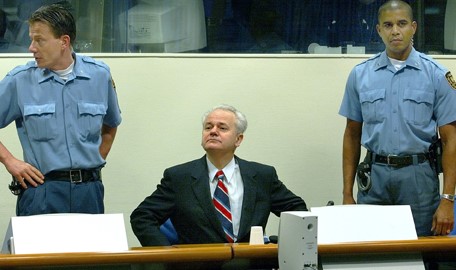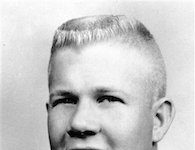On February 12, 2002, the war crimes trial of Serb leader Slobodan Milosevic began at The Hague. The defendant died before a sentence was passed.
Milosevic Put On Trial for War Crimes
Slobodan Milosevic became president of Serbia in 1989 under the nationalist banner of a Greater Serbia. He stirred up xenophobic hatred of non-Serb ethnicities and waged war against Bosniacs and Croats in Bosnia and Herzegovina after they voted to secede.
In 1999, he ordered Serbian forces to crush Kosovar insurgents, prompting a bombing campaign against Serbia by NATO. Milosevic responded by launching a genocidal campaign against the Kosovar Albanians.
Milosevic was defeated in the Yugoslavia presidential election in 2000. A year later, he was arrested by the Yugoslav government on corruption charges; he was later transferred to the custody of the International Criminal Tribunal in Yugoslavia, which had charged him with war crimes and crimes against humanity in 1999.
Milosevic was put on trial at The Hague in the Netherlands, facing 66 counts for crimes against humanity, genocide and war crimes committed in Bosnia, Croatia and Kosovo. He showed contempt for the court’s authority and refused to hire a lawyer.
Human rights activists had high hopes for the trial. The New York Times, calling the trial the “most important war crimes trial in Europe since Nuremberg,” wrote “His trial is a triumph for the civilized world, which has created a court capable of condemning the most heinous crimes with appropriate gravity and fairness.”
Prosecutors spent four years presenting their case, calling 293 witnesses. Milosevic defended himself on the witness stand and while examining witnesses. “Milosevic called dozens of witnesses to back up his arguments and has comported himself more respectfully than during the prosecution phase, when he was bullying witnesses,” wrote CNN.
The trial was frequently delayed by Milosevic’s health problems. On February 24, 2006, Milosevic asked to obtain medical treatment in Russia, but his request was denied. He would die in his jail cell March 11, 2006, concluding the trial without a verdict.
Critics complained that the trial was too slow, that Milosevic should not have been able to defend himself and that all of his crimes should not have been combined into one trial. Human Rights Watch defended the trial, arguing that Milosevic’s death “should not diminish the trial’s other accomplishments.” It claims that information from the trial, such as video, “engendered a great deal of national discussion in Serbia, forcing people to confront the fact of atrocities they had previously denied.”
Sources in this Story
- Encyclopedia Britannica: Slobodan Milosevic
- The New York Times: The Trial of Slobodan Milosevic
- CNN: Milosevic’s war crimes trial a 4-year marathon
- Human Rights Watch: Weighing the Evidence
- The BBC: Yugoslavia & the Balkans
- The BBC: Timeline: Break-up of Yugoslavia
- The BBC: History, bloody history
- PBS: Frontline: War in Europe
Background: Milosevic and the Balkan Wars
The Ottoman Empire invaded the Balkans at the end of the 14th century, and its rule lasted about 500 years. However, as the Ottoman Empire began to collapse, nationalism took over in the Balkans and infighting plagued the region.
The Kingdom of Serbs, Croats and Slovenes was created after World War I and named Yugoslavia in 1929. The Serbs quickly dominated the government. After World War II, Yugoslavia was once again declared a state, ruled by the Communist regime of Marshall Tito, who ruled until his death in 1980. From early on, the federation was dominated by Serbia.
With the breakup of the USSR, the early 1990s saw Yugoslavia’s constituent republics secede from the federation. Croatia declared its independence in 1991, and the Serbs responded with force in the first of the Yugoslav wars.
Bosnia’s population was more diverse than Croatia’s. Forty percent of Bosnians were Muslims, 30 percent were Serbs and 18 percent Croats. When Bosnia-Herzegovina declared its independence in 1992, each ethnic group vied for national power.
Milosevic and other Serbian nationalists supported the Bosnian Serbs in their efforts to create a Greater Serbia in Bosnia, so they instigated a campaign of ethnic cleansing, which led to the expulsion, imprisonment, murder and rape of Bosnian Muslims.
In 1998, fighting also broke out in Serbian-controlled Kosovo. The large ethnic Albanian population sought to break away from Serbian influence. NATO responded by launching air strikes.
The Kosovo Albanians fled, and there were “accounts of killings, atrocities and forced expulsions at the hands of Serb forces,” according to the BBC. More than 90 percent of the Kosovar-Albanian population may have been displaced during the war.
PBS provides a timeline for the Balkan wars, which goes back to 1987 and Slobodan Milosevic’s rise to power, and ends in September 1999 with the complete demilitarization of the Kosovo Liberation Army.
Reference: Trial Documents and Analysis
The Hague’s Milosevic Trial Archive contains video, audio, transcripts and commentary from the trial.











